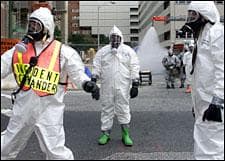Advertisement
Anthrax and the Biodefense Debate
Resume
But behind all the drama is an intense debate over whether the U.S. — after seven years and more than $50 billion spent — is any better prepared for a bioterror attack. Critics say the U.S. remains far too vulnerable. Others say progress has been real, if slow — and that the threat is devilishly complex.
This hour, On Point: the anthrax investigation, and the biodefense debate.
You can join the conversation. Have you followed the anthrax case? What lessons should we draw from the new revelations? Are you confident that the U.S. government is prepared for another attack? Tell us what you think.
* * *
Guests:
Joining us from Washington is Siobhan Gorman, intelligence and homeland security correspondent for The Wall Street Journal. Her piece in yesterday's paper looked at the persistence of the bioterrorism threat.
From Minneapolis, we're joined by Michael Osterholm, director of the Center for Infectious Disease Research and Policy at the University of Minnesota. He sits on the National Science Advisory Board for Biosecurity. From 2001 to 2005, he was advisor to the Secretary of Health and Human Services.
Joining us from Annapolis, Maryland, is Tara O'Toole. She's CEO and director of the Center for Biosecurity at the University of Pittsburgh Medical Center and a professor of medicine and public health at the University of Pittsburgh. From 1993 to 1997, she served as Assistant Secretary of Energy for Environment Safety and Health.
And with us from Washington is Alan Pearson, director of the Biological and Chemical Weapons Control Program at the Center for Arms Control and Non-Proliferation. In recent years, he’s worked at the Department of Homeland Security to streamline and refine the bioterror spending.
This program aired on August 5, 2008.